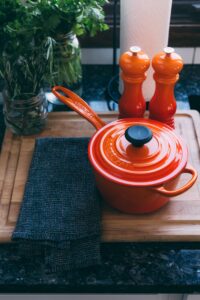Looking for the best cookware for your gas stove? You’re in the right place! Whether you’re a casual home cook or a culinary expert, choosing the right type of cookware is essential for optimum performance and safety. In this article, we’ll address some common questions that consumers have about cookware, such as which type is the safest and which offers the best quality. So, let’s get started and find the perfect cookware for your gas stove!

This image is property of images.unsplash.com.
Factors to Consider
When choosing cookware for your gas stove, there are several factors you should consider to ensure you make the right choice. These factors include heat conductivity, material compatibility, durability, maintenance, and versatility. By understanding these factors, you can make an informed decision and select the best type of cookware for your gas stove.
Heat Conductivity
Heat conductivity refers to how well the cookware conducts heat from the stove to the food being cooked. It is an important factor to consider as it affects the cooking time and efficiency. Certain materials have higher heat conductivity than others, which means they heat up quickly and distribute heat evenly. Copper and aluminum are known for their excellent heat conductivity, making them popular choices for gas stoves.
Material Compatibility
Material compatibility is another crucial factor to consider when selecting cookware for your gas stove. It refers to the type of cookware material that is safe to use on gas stoves without causing any damage. Most cookware materials are compatible with gas stoves; however, there are a few exceptions. Glass, for example, is not suitable for gas stoves as it can shatter due to rapid temperature changes. It is important to ensure that the cookware you choose is compatible with gas stoves to avoid any accidents.
Durability
Durability is an important consideration when it comes to cookware, as you want a set that will last for a long time. Some materials, such as cast iron and stainless steel, are highly durable and can withstand high heat and heavy use. On the other hand, materials like non-stick coatings may wear off over time and require replacement. It is essential to choose cookware that is built to last, ensuring that you get the most value for your money.
Maintenance
The ease of maintenance is another factor to consider when selecting cookware for your gas stove. Some materials require special care and attention, while others are dishwasher-safe and easy to clean. Stainless steel and cast iron are known for their ease of maintenance, as they can withstand scrubbing and are resistant to staining. Non-stick cookware, on the other hand, requires gentle cleaning to avoid scratching the coating. Consider your preference for maintenance when choosing cookware for your gas stove.
Versatility
Versatility is an important factor to consider if you want your cookware to be suitable for various cooking techniques. Some materials, like stainless steel and cast iron, are versatile and can be used for a wide range of cooking methods, including searing, sautéing, frying, and even baking. Other materials, like copper, excel in specific cooking techniques, such as heat-sensitive sauces. Consider the type of cooking you do most often and choose cookware that is versatile enough to accommodate your needs.
Types of Cookware
There are several types of cookware available in the market, each with its own advantages and disadvantages. Understanding these types will help you make an informed decision and choose the best cookware for your gas stove.
Cast Iron
Cast iron cookware is known for its excellent heat retention and distribution. It heats up slowly but evenly, allowing your food to cook evenly. Cast iron is highly durable and can withstand high temperatures, making it ideal for gas stoves. Additionally, cast iron develops a natural non-stick surface when properly seasoned. However, it is important to note that cast iron cookware requires special care and maintenance to prevent rusting.
Carbon Steel
Carbon steel cookware is similar to cast iron but is lighter and more responsive to heat. It heats up quickly and evenly, making it suitable for various cooking techniques. Carbon steel pans also develop a non-stick surface when seasoned properly. However, carbon steel cookware requires regular seasoning and maintenance to prevent rusting.
Stainless Steel
stainless steel cookware is a popular choice for gas stoves due to its durability and versatility. It is resistant to corrosion, staining, and scratching, making it ideal for everyday cooking. Stainless steel cookware is also dishwasher-safe and easy to clean. However, stainless steel alone is not a good conductor of heat, so stainless steel cookware often has an aluminum or copper core to improve heat conductivity.
Copper
Copper cookware is widely regarded as the best for heat conductivity. It heats up quickly and distributes heat evenly, allowing for precise temperature control. Copper cookware is often lined with stainless steel to improve durability and prevent any reaction between the copper and acidic foods. It is important to note that copper cookware requires regular polishing to maintain its appearance.
Aluminum
aluminum cookware is known for its excellent heat conductivity, making it energy-efficient and ideal for gas stoves. It heats up quickly and evenly, allowing for even cooking. However, aluminum alone is prone to reacting with acidic foods, resulting in a metallic taste. To prevent this, most aluminum cookware is anodized or has a non-stick coating.
Non-Stick
Non-stick cookware is coated with a layer of non-stick material, usually Teflon or ceramic. The non-stick coating prevents food from sticking to the surface, making it easy to clean. Non-stick cookware is also great for low-fat cooking, as it requires less oil or butter. However, non-stick coatings can wear off over time and need to be replaced. It is important to note that high heat can damage non-stick coatings, so it is best to use them at medium to low heat.

This image is property of images.unsplash.com.
Conclusion
When it comes to selecting the best type of cookware for your gas stove, it is important to consider factors such as heat conductivity, material compatibility, durability, maintenance, and versatility. Each type of cookware has its own advantages and disadvantages, and it ultimately depends on your personal preferences and cooking style. Cast iron and stainless steel are popular choices for their durability and versatility, while copper and aluminum excel in heat conductivity. Non-stick cookware offers convenience and easy cleanup but requires careful maintenance. By understanding the different types of cookware and considering these factors, you can make an informed decision and find the perfect cookware for your gas stove.

